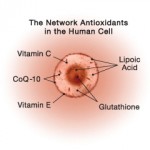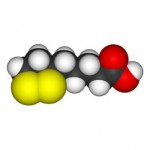Available in each cell of your body – very much like glutatione – alpha lipoic acid (ALA) is an antioxidant that helps your cells transform glucose into energy. Different from antioxidants like Vitamin C which can exclusively work in water or vitamin E which only works in fat , ALA functions in both water and fat. It functions everywhere in your body. Like other antioxidants, ALA helps clear free radicals -metabolic waste – from your cells before they become junked up and toxic from a build up of waste. As opposed to many other antioxidants, ALA has the ability to help to revive other antioxidants after they have cleared out the odd electrons and renders them ready to continue to neutralize more free radicals.
ALA is also used as a short form for Alpha Linolenic Acid which is an omega-3 fatty acid, connected with heart health, but this is a different substance from Alpha lipoic acid – also referred to as Lipoic Acid.
Several studies have indicated that ALA may be able to help reduce levels of blood sugar and combined with it’s antioxidant properties, ALA could possibly be beneficial to people suffering from diabetic peripheral neuropathy, relieving some of the discomfort brought about by nerve damage.
Scientists are studying alpha lipoic acid to determine its effectiveness against glaucoma although they are yet to collect enough data, but because it can pass easily to the brain, it is possible that ALA may well be useful as a protector against brain and nerve tissue damage. It is now being studied as a possible treatment for stroke and other brain problems with root causes based on free radical damage. Dementia is one such condition.
ALA is an ingredient in Cellgevity where it contributes to the regeneration of the network antioxidants and supports the glutathione network.

